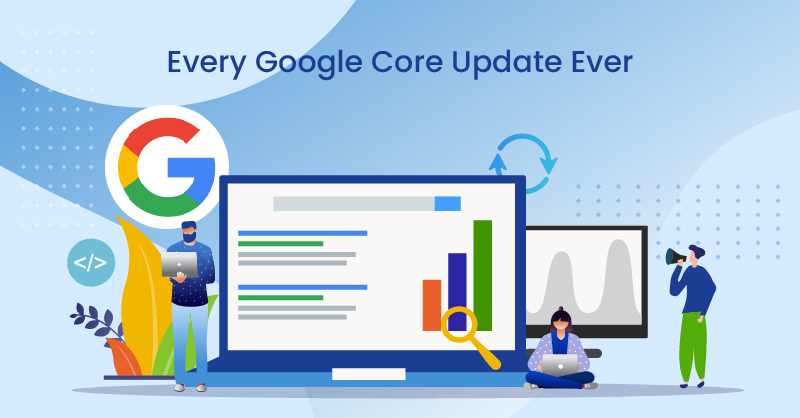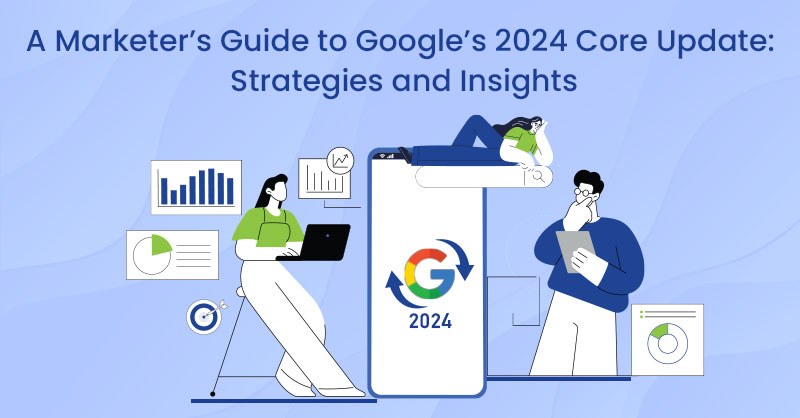May 2022 Google Core Update
On May 25th, 2022, Google announced a new core update would be initiated. It would two about two weeks to finish rolling out. As usual, Google was not especially forthcoming about what this update would entail.
Like all core updates, the purpose is to improve search results, so users get fast, accurate and helpful information from relevant sources.
This update was content-oriented, focusing on improving how Google Search evaluates and displays different types of content. If your website has been negatively hit, a good place to start is Google’s troubleshooting questions
The general purpose of any core update is to improve Google search’s algorithm to reward high-quality and relevant content. According to Google Search Advocate John Mueller:
“With the core updates, we don’t focus so much on just individual issues, but rather the relevance of the website overall."
You can optimize your website around this concept by creating content that effectively answers users' questions and provides reliable sources.
What We Know So Far
Google announced on Twitter that the update rollout had been completed as of June 9, 2022. The update was implemented across the globe for all countries and languages that are on Google.
So far, websites with lots of user-generated content and affiliate marketing websites seem to be taking a negative hit, with many webmasters who run these websites reporting a significant decline in organic rankings.
There has also been a lot of chatter around featured snippets, with many smaller websites reporting that they were losing their featured snippet displays even without a drop in search rankings.
The general line of consensus in the May Core update thread is that;
- Google has made it incredibly hard to get featured in snippets,
- Google has not penalized AI-generated content as much as previously thought
- A much stronger preference is given to higher authority websites even if their content is not as good as that of lower authority competitors.
One thing to keep in mind anytime you look at community forums, especially during a core update, is that most SEOs, webmasters and website owners are not going to be active in these forums if their websites are not heavily affected by the update.
They will likely not bother posting even if the update has helped their website, so the information is always going to be negatively skewed.
After all, most people use these platforms for help, so the majority of the responses after a big update are going to be focused on that aspect.
We know that EAT (Expertise, Authoritativeness, Trust) is a core guiding principle of Google. Google wants to display content that helps answer users' questions.
Content from trustworthy experts who are authority figures in their industries is more likely to provide accurate answers to users than content from bloggers.
This could be a big reason why many affiliate and multi-niche websites seem to be getting hit the hardest; they are not experts in their field.
In 2019 Google confirmed that while there is no ranking signal for EAT, there are several signals that embody EAT principles.
Let’s also remember that the latest update, the March 2022 Product Review update, placed a special emphasis on promoting in-depth, expert reviews of products over generic, basic-level reviews.
To fight misinformation, Google News made changes in early 2022 to add ‘highly cited’ labels to news stories to direct readers to the original sources of content.
All of this is indicative of a push to prioritize authoritative websites and expert content creators in SERPs, and the early results of the May 2022 Core Update appear to prove this trend.
It would explain why bloggers, affiliate marketers, and small website owners seem to be the biggest victims of the latest update.
How to Optimize Your Website for the May 2022 Core Update
Evaluate AI Content & Optimize for Readability
Early results from the update appear to have seen some ranking decline for websites with AI-generated content, but not nearly as significant as previously assumed.
This suggests that Google may improve at evaluating AI content and that having it on your website is not necessarily bad if it provides value.
It’s important to remember that Google stated, “In cases where it's intended to manipulate search rankings and not help users, Google may take actions on such content.”
This does not mean that all AI content is intrinsically bad, as many seem to think. If your website does have AI content on specific pages, monitor those pages for the next 2 to 3 weeks to see if there is a big change in performance.
If there is a negative change, consider adding a human factor to how your AI content is generated or tweak the current content to make it sound like it came from a human.
A common issue caused by AI copywriting tools is keyword stuffing and readability. Check these elements closely when going through any AI content on your website.
Optimize Top Content for Featured Snippets
As of June 16th, we are already starting to see new featured snippet layout forms being displayed for some searches:

These changes reflect a long-standing trend of Google adding more content to SERPS. The reason behind it is to display answers to questions users are searching for quickly.
More featured snippets provide faster, more specific answers to questions and help keep people on the SERP longer, both of which benefit Google.
They provide more answers to queries more effectively by pulling the answers directly from websites, improving their service, and they keep users on Google much longer, which increases the chances they click on ads and earns Google greater revenue.
These recent changes mean getting your content displayed in a featured snippet has become an even bigger part of SEO than it already was.
Featured snippets have a much higher CTR than any organic listing on the SERP, which makes them great at driving traffic if your website is optimized for them.
If not, you may become their next victim. This is because featured snippets crowd SERPs and push down organic listings.
Before the May 2022 update, snippets and ads were already limiting organic listings on page 1 in a big way, often leaving only eight organic listings instead of the usual 10.
As more featured snippets get displayed due to the update and in increasingly spacious forms, as shown above, getting on page 1 is becoming much harder to do, and getting shown in a snippet has never been more important.
Only websites that rank in the top 10 organic listings for a given search query will be eligible to be selected for featured snippets.
To improve your chances, look at your top-performing pages (or any page that ranks at or near the top 10 for its keywords) and add structured data or schema markup to your page, especially for any lists, charts, images or paragraphs that succinctly describe the topic.
For important pages on your website or those that talk about complex topics, add some FAQs with structured data, or create headings from questions people are asking related to the target keyword.
You can use analytic tools like Google Search Console or SemRush to find questions with high search volume related to your target keyword for a given page and then edit the content so that the question(s) are answered effectively.
You generally want these answers to be no longer than a paragraph, and you want the answer to be under a heading with the keyword in it (or even a heading that is the question itself).
Focus on Search Intent
As Google’s algorithm becomes better at understanding the purpose behind different searches, search intent becomes much more important.
Early results of the May 2022 update appear to show ranking declines for websites that focus on a wide range of topics like news magazines (and many affiliate marketing websites), while websites that focus on fewer topics, like many specialized E-commerce websites, grew.

A core component of the BERT update was to improve how the algorithm understands language and the different relationships words have together to determine the search intent of queries better.
The better Google can understand the purpose of a given search query, the more accurate information it can find to display. These early results from the May 2022 update appear to fulfill search intent more accurately.
Instead of trying to rank one page for lots of different keyword variations, target keywords that have a specific search intent that matches the purpose of your page and the content on it.

Image Source: Seobility - License: CC BY-SA 4.0
If your page lists products that can be bought, focusing on transactional keywords instead of broader, more generic terms can help your store rank.
It can be tempting to go for broader, short-tail keywords since they often have high search volumes, but with this new update, their lack of search intent will make it harder for most smaller websites to rank for them.
What to Check After a Core Update
If you want to get a good idea of how your website is being affected by a core update, you generally want to be monitoring these metrics:
- Organic traffic through Google Analytics, Ahrefs, SemRush or other SEO tools
- Keyword rankings, clicks and CTR on Google Search Console
- Conversion goals and sales through Google Analytics or CRM software
- Featured Snippet Visibility through Google Search Console
Closing Thoughts on Google’ May 2022 Core Update
In 2021, Google ran nearly 400,000 search quality tests to evaluate how the search algorithm was working and used this data to make over 3,000 changes to the algorithm.
In 2020, they ran over 600,000 tests that led to over 4,000 changes to Google search. So, in recent years, Google has been making a concerted push to change how organic search works significantly and to evolve alongside changing user behaviour.
The driving ethos behind Google’s core updates is to reward websites that the current algorithm is not properly displaying.
The idea is to optimize how Google’s search algorithm ranks websites, so the best ones are at the top.
This will always be a work in process; not only do websites change over time, but so do searches. The way users look for information on Google is ever-changing, and the search algorithm needs to change with it to ensure the best websites and information is at our fingertips.
It’s important to be proactive; don’t simply hope the next update will magically improve your website. You need to ensure that the information on your website has relevant and authoritative answers to the questions your target audience is searching for online.
Google is also seeking to further crack down on websites engaging in shady tactics, otherwise known as “black-hat SEO.”
Some examples of black-hat SEO include deceptive tactics like using duplicate content on your website, user-generated spam, keyword-stuffing, auto-generated content, hidden links, and more.
If you notice that your website has taken a big hit since the latest core update, then you need to reevaluate your content and ensure that you are not engaging in any black-hat tactics.
You also may need to spend more resources demonstrating your brand’s expertise, building high-quality backlinks and gaining topical authority by working with other industry experts.
Look at the official webmaster guidelines Google has provided and ensure your website is not violating any of them.
If everything checks out, think about how you can make your website more authoritative, focused on search intent, optimized for featured snippets, and how you can upgrade your existing content according to EAT principles.
Previous Google Core Updates
Also check out our analysis on some major Google core updates.
Google Core Update May 2020
This article includes data and analysis of Google’s May 2020 Core Update.
Google came up with its 2nd Core Update of 2020 amidst the coronavirus pandemic. They published the update on May 4th, terming it the ‘May 2020 Core Update’.
Like other core updates, it was not targeted at any specific aspect of the algorithm.
Google Core Update January 2020
Google kicked off 2020 by releasing its broad core algorithm update called the January 2020 Core Update on Twitter on January 13, 2020.
The update is non-specific and is applicable worldwide, so there is no one thing to address if a website drops in ranking or traffic. All we can do is just focus on the quality of content. A high performing website on Google SERP always has great content.
Google Core Update September 2019
“September 2019 Core Update,” rolled out in September 2019, and was their third global update in 2019.
After the implementation of the September Core Update 2019, Mozcast, a ranking tracker, recorded a high level of turnover on that date and variations in SERPs more than usual. Users reported changes in the Webmasterworld forum. Many websites that saw a radical rank drop during the July 2019 Core Update have now restored to regular ranking with this latest update.
Google Core Update June 2019
Google rolled out it’s latest core algorithm update between Monday, June 3 and Saturday, June 8.
The core algorithm update took five days because it takes time to roll out the changes across all of Google’s servers and data centres around the world.
Please have a look at our latest blogs here






on
Very nice Post
on
Hello there! Very informative and fantastic post you have here for the interested audience like myself. No lengthy paragraphs, straightforward explanations, and all of the google core updates that they have released so far have been discussed over here. I’m new in the field of digital marketing, especially in Search Engine Optimization, so I explored a lot of posts that were having content related to google cores to understand the updated algorithm that could help me boost organic traffic and keyword research for my projects, and found your post very interesting and helpful.
on
Great! I was not aware of this yet. Thanks for sharing this blog it is really helpful for me. You have a great knowledge about this topic. Keep sharing your valuable thoughts with every new update of digital world.